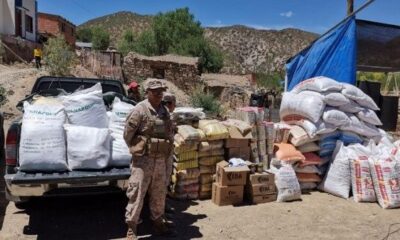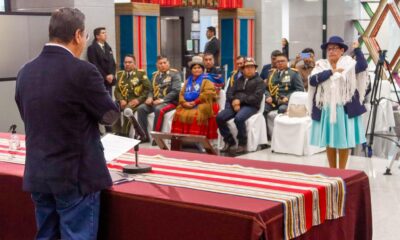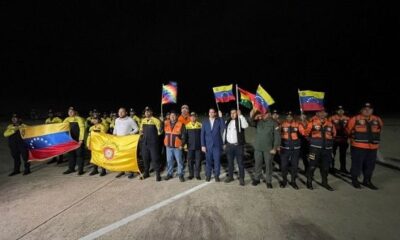International
Morales affirms that there will be “a seizure” in Bolivia if he is disqualified in the 2025 elections
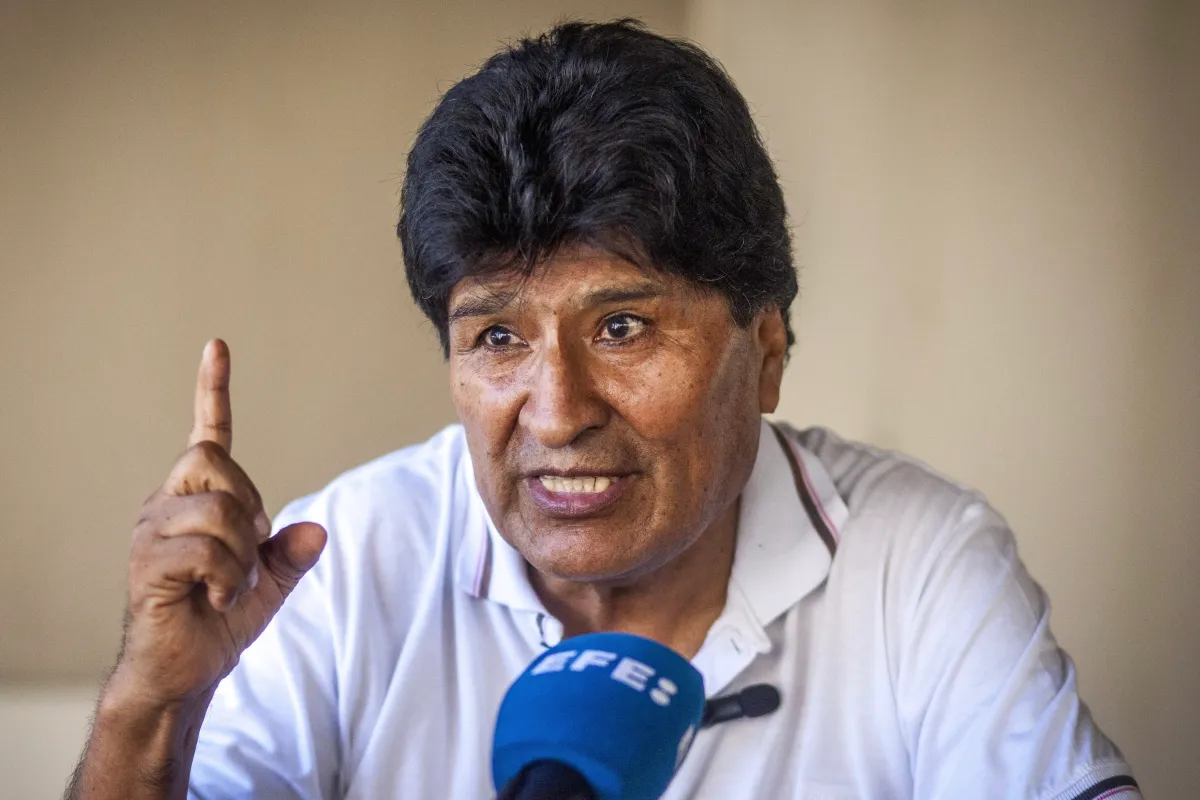
The former president of Bolivia Evo Morales (2006-2019) said in an interview with EFE that there will be a “convulsion” in the country if his presidential candidacy for the 2025 elections is disqualified and blamed the Government of Luis Arce, with whom he has a fight despite belonging to the same party.
“If Evo is disabled, there will be a seizure. If you want that, well, that will be the responsibility of the Government (…) that’s my calculation, I’m sincere,” warned the also leader of the ruling Movement for Socialism (MAS).
Morales considered that “this kind of struggle is only won with mass action,” and said that he heard that various sectors anticipate “difficulties” in case his presidential candidacy is annulled.
At the end of last year, the Constitutional Court issued a ruling in which it mentions that indefinite re-election “is not a human right” and that it is only applied for once in a continuous or discontinuous way.
According to Morales, this must be understood as “an insinuation of a possible disqualification of his candidacy.”
The three-time president of Bolivia insisted that he is “legally and constitutionally authorized” to be a candidate, according to the consultations he himself made to “national and international experts.”
The ruling Movement for Socialism turns 29 years old and it is the first time that there are two separate celebrations.
In the city of La Paz, headquarters of the Government and the Legislative, the ‘arcist’ block celebrates, which supports President Luis Arce, while this Saturday will be the turn of the ‘evista’ wing, related to Evo Morales, in the town of Yapacaní, in the department of Santa Cruz.
Last year Morales and Arce coincided on the anniversary of the party in the Tropic of Cochabamba, the political bastion of the former president, in which there was friction among the militants of the MAS.
In that event, Evo Morales questioned the management of the one who was his Minister of Economy during his government, while Arce urged the MAS not to be afraid of the “pluralism” of ideas.
Morales pointed out that Arce “made a big mistake” by pointing out that “we should not be afraid of the pluralism of ideas” since, in his opinion, that marks an “ideological difference” with the ‘arcist’ sector, since the MAS is traditionally “anti-imperialist.”
The former president also questioned that the Arce Administration has not fulfilled two of the main mandates he received when he arrived at the Government in 2020, such as “prosecusing and imprisoning the coup plotters and genocide” for the 2019 crisis and “recovering the country’s economy”.
Morales resigned from the Presidency in 2019 after considering that he was the victim of a “coup d’état” after the frustrated elections of that year, between complaints from the opposition of an electoral fraud in his favor for a fourth consecutive term.
On November 12, 2019, Jeanine Áñez assumed the interim command of the country as the second vice president of the Senate, two days after the resignation of Evo Morales and all the officials in the presidential succession line.
“I thought that if (I) would return (to be president of Bolivia) it would be to do justice (…) because I have been given a (state) coup,” he said.
To the division for the anniversary of the MAS is added the struggle for the legality of the MAS congress, which was held last year in the Cochabamba region, and in which Morales was proclaimed as the “single candidate” for the 2025 presidential elections.
The ruling sectors related to Arce called for another congress, which will be held in May, after the electoral authority determined that a new meeting should be held.
Morales insisted that the congress that re-elected him as the top leader of the MAS met all the requirements and that the electoral body acted with “illegality,” while the call of the “arcists” is made by those who “are not militants” in that party.
The former president ratified that the MAS “is united at the level of the bases” and that a few leaders decided to demarcate themselves in exchange for alleged “bribes” offered to them by the Government.
International
DHS Secretary Kristi Noem’s Purse Stolen in D.C. Restaurant Heist

The purse of Kristi Noem, Secretary of the Department of Homeland Security, was stolen on Sunday night at a restaurant in Washington, D.C., Fox News Digital confirmed through several agency sources.
The handbag, taken by a white male wearing a mask, reportedly contained $3,000 in cash along with personal documents, including her passport, keys, driver’s license, and DHS badge, according to an agency spokesperson.
“Her entire family was in town, including her children and grandchildren. She was celebrating her retirement by treating them to dinner, activities, and Easter gifts,” the spokesperson added.
Crime continues to be a significant issue in the U.S. capital, particularly theft. However, violent crime reached its lowest level in 30 years last year, according to the Office of the Attorney General at the time.
International
Pope Francis: The Quiet Architect Behind the U.S.-Cuba Thaw
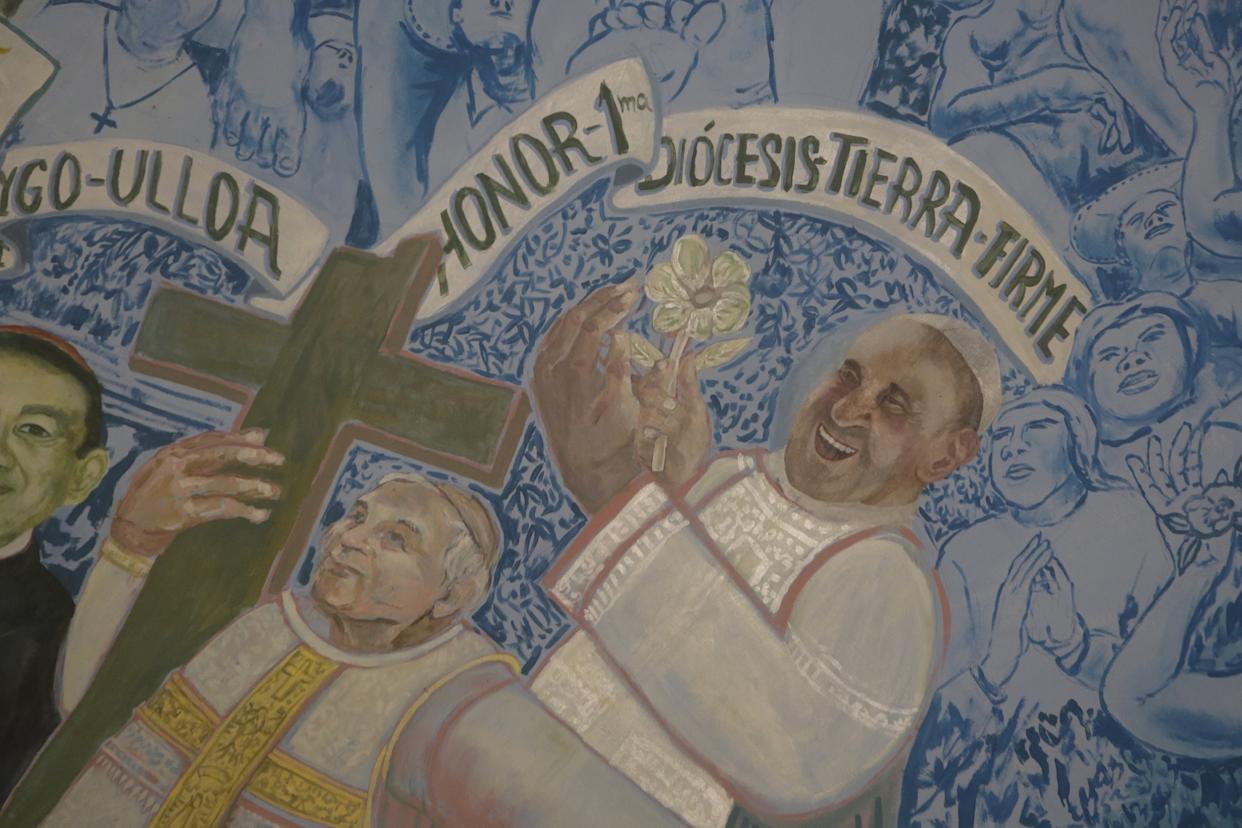
When then-U.S. President Barack Obama and Cuban President Raúl Castro announced the reestablishment of diplomatic relations in December 2014—after decades of hostility—there was a third figure present in both speeches: Pope Francis.
This thaw in U.S.-Cuba relations—later reversed by Donald Trump—was the result of behind-the-scenes negotiations personally encouraged by Pope Francis, who passed away on Monday at the age of 88, just over a year after becoming head of the Catholic Church.
Upon learning the news of the breakthrough, the pontiff humbly stated, “This was made possible thanks to the ambassadors and to diplomacy,” which he called “a noble, very noble job.”
In 2015, months after the announcement, Raúl Castro visited the Vatican and met with the pope. Over time, Castro developed a fondness for Francis that he never had for his predecessors, Benedict XVI and John Paul II. “If the Pope continues talking like this, sooner or later I’ll start praying again and return to the Catholic Church—and I’m not joking,” said the younger Castro, who, like his brother Fidel (1926–2016), had been educated by Jesuits—the same order to which Pope Francis belonged.
Pope Francis visited Cuba later that year. Just days before his arrival, the Cuban government announced the pardon of 3,522 common prisoners as an act of clemency.
While in Havana, the pope met with Fidel Castro, who gave him a first edition of the book Fidel and Religion by Brazilian friar and liberation theologian Frei Betto.
Criticism from the Opposition
Francis’s diplomatic approach also drew criticism from parts of the Cuban opposition. In a 2022 interview with Univision, the pope revealed he had “a human relationship” with Raúl Castro.
International
Dominican Republic Declares Three Days of Mourning for Pope Francis

Dominican Republic President Luis Abinader has declared three days of national mourning starting Tuesday following the death of Pope Francis, who passed away on Monday at the age of 88 in his residence at the Casa Santa Marta.
In an official decree, Abinader highlighted the pope’s legacy “as a global leader who promoted significant reforms within the Catholic Church and was known for his humility, openness to dialogue, and commitment to peace among nations.”
During the mourning period, the national flag will be flown at half-staff at military facilities and public buildings.
According to a statement from the Office of the Presidency, although Pope Francis never visited the Dominican Republic during his papacy, he maintained a close relationship with the country. He expressed solidarity and empathy during difficult times, including offering prayers for the victims of the recent tragedy at a Santo Domingo nightclub on April 8, which claimed 232 lives and left more than 180 injured.
-

 Central America5 days ago
Central America5 days agoNicaraguan Exiles to Mark 7th Anniversary of 2018 Protests with Global Commemorations
-

 International5 days ago
International5 days agoDominican ‘False Hero’ Arrested for Faking Role in Nightclub Collapse That Killed 231
-

 Central America3 days ago
Central America3 days agoUN complaint filed against Costa Rica over detention of migrant children
-

 International3 days ago
International3 days agoACLU seeks emergency court order to stop venezuelan deportations under Wartime Law
-

 Central America1 day ago
Central America1 day agoSenator Van Hollen Meets with Deported MS-13 Member in El Salvador; Trump and Bukele React
-

 International2 days ago
International2 days agoThousands rally nationwide against Trump’s threat to U.S. democracy
-

 International1 day ago
International1 day agoPope Francis Appears for Easter Blessing, Calls for Peace and Religious Freedom
-

 Central America9 hours ago
Central America9 hours agoCardinal Rodríguez to Attend Funeral of Pope Francis: “He Was Very Dear to Me”
-

 Central America9 hours ago
Central America9 hours agoNicaragua’s Ortega and Murillo Mourn Pope Francis, Acknowledge ‘Difficult’ Relationship
-

 International9 hours ago
International9 hours agoDominican Republic Declares Three Days of Mourning for Pope Francis
-

 International9 hours ago
International9 hours agoDHS Secretary Kristi Noem’s Purse Stolen in D.C. Restaurant Heist
-

 International9 hours ago
International9 hours agoPope Francis: The Quiet Architect Behind the U.S.-Cuba Thaw
















